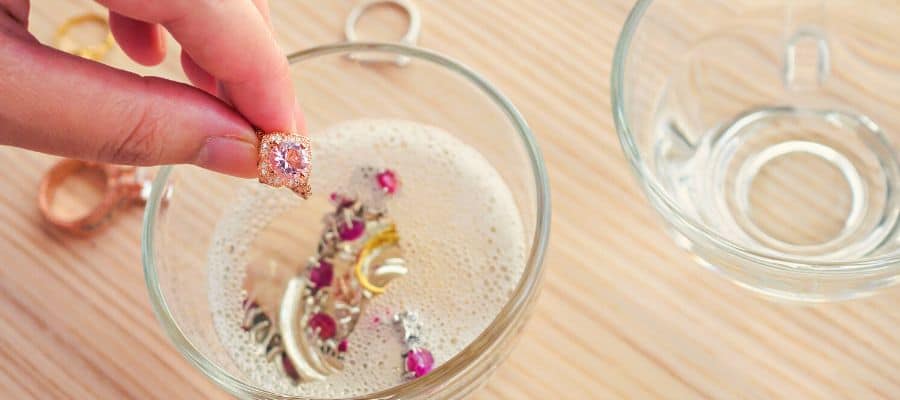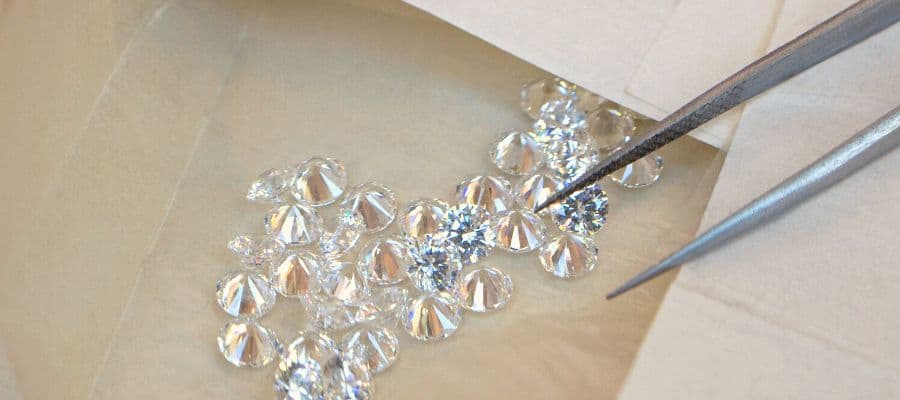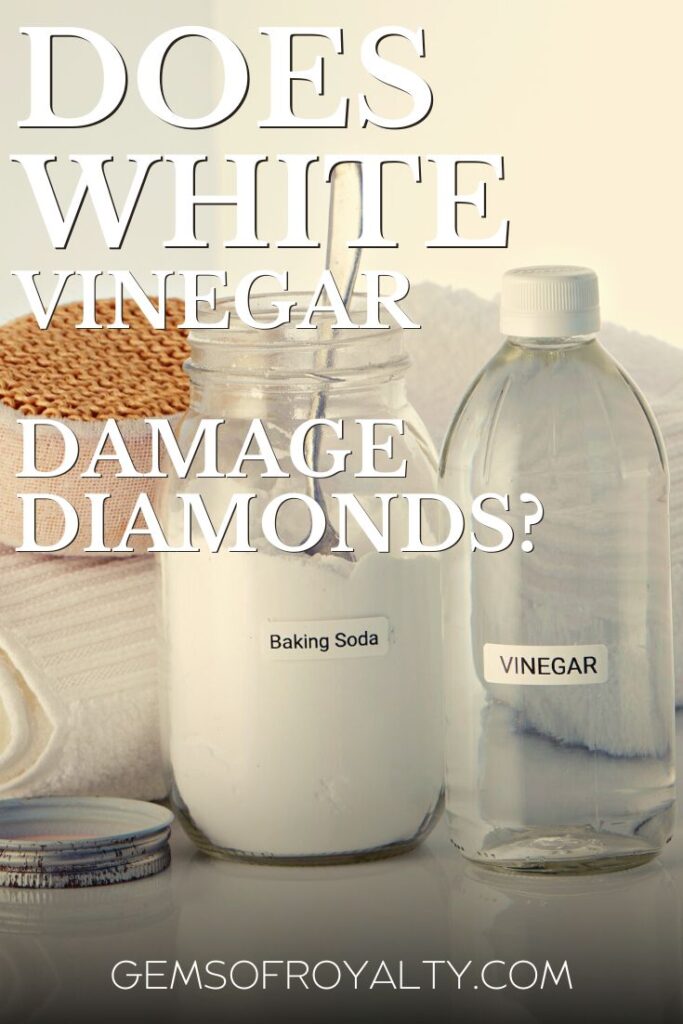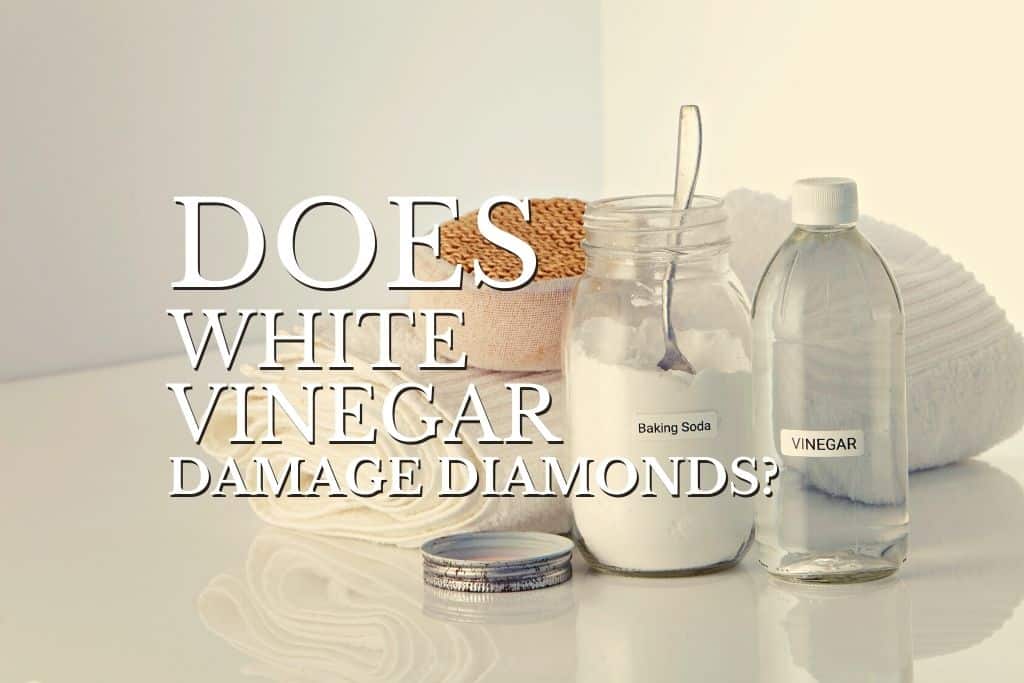Diamonds are delicate gems and require precision while cleaning. However, professionally cleaning a diamond is only sometimes affordable. Instead, you can use household items like white vinegar to clean your diamonds and make them sparkle again.
White vinegar does not damage diamonds if you dilute it. Vinegar is a naturally acidic substance that polishes diamonds until they sparkle, so it’s suitable for non-porous gems like diamonds, rubies, and sapphires. However, it isn’t suitable for porous gems like emeralds or pearls.
In the rest of this article, I will discuss the effects of white vinegar on diamonds. I’ll also explain how to clean diamonds safely with vinegar. Let’s get started!
How To Safely Clean Diamonds With Vinegar

White vinegar is one of the most common home remedies you can use on your diamonds to maintain their sparkle. While vinegar is commonly known for cooking purposes, its second most famous feature is its cleaning properties.
White vinegar isn’t as strong as other kinds of vinegar. Thus, it’s perfect for delicate jewelry. It keeps the stones and metal polished and sparkly without being too abrasive.
However, because it’s an acidic substance, you should only use it on jewelry that doesn’t contain reactive elements. You can safely use it on gold and silver jewelry with hard gemstones like diamonds and rubies. However, you can’t use it on soft stones like emeralds.
1. Dilute the White Vinegar to Avoid Damaging Your Jewelry
Vinegar is highly acidic and can damage your jewelry beyond repair if you don’t dilute it. Thus, the first step in creating a vinegar-based cleaning solution is to neutralize its acidity with an alkaline substance like baking soda.
Here are the steps to create a white vinegar cleaning solution.
- Mix water and white vinegar in equal parts. Using white vinegar is especially important because of its ability to clean pure metals. Other types of vinegar are more potent and can have a damaging effect on the diamonds.
- Mix two teaspoons (9.6 grams) of baking soda into the solution. The baking soda activates the cleaning agents in vinegar, polishing the diamonds until they look brand new.
It’s important to dilute the vinegar before cleaning your jewelry. This process can further lessen the acidic properties of the vinegar and leave you with a safer mix to use.
2. Leave Your Diamonds To Soak in the White Vinegar Mixture
Since gems come in different shapes and sizes, there are many ways to clean them without damaging them. No single method is better than the other. However, the easiest method is to soak the jewelry in the white vinegar mixture.
If your jewelry isn’t really dirty and just needs a little extra shine, you can soak it in the vinegar mixture for 10-15 minutes. However, you can keep it in for as long as 2-3 hours for caked dirt or tough stains.
3. Use a Soft-Bristled Toothbrush to Scrub the Diamonds Gently
Once your jewelry has soaked for long enough, you can remove it from the bowl and use a soft toothbrush to remove extra dirt. The vinegar mixture would have loosened any caked dirt or debris. All that’s left is to scrub the loosened dirt off softly.
Once you’ve removed the dirt, you can either soak the jewelry in water or a solution containing mild dish soap to clean it more thoroughly. Alternatively, you can rinse it off under running water.
4. Lightly Pat the Diamonds Dry
After cleaning the diamond jewelry, all that’s left is to dry it. Remember to be gentle when drying to avoid abrasions.
- Remove the jewelry from the mixture and place it on a soft cloth.
- Fold the edges of the cloth over the jewelry to cover it.
- Lightly pat the jewelry dry to remove excess moisture.
- Leave it out to air dry for some time.
What Does Vinegar Do To Diamonds?

While vinegar has cleaning and polishing properties, it also puts gemstones at risk of scratches and contamination when you do not use it carefully.
Using too much of anything can backfire, especially where science is concerned. Here are a few examples of vinegar’s harmful effects on gemstones.
- Vinegar can contaminate porous gemstones. Porous stones like pearls or emeralds can absorb small amounts of liquid. Thus, acidic solutions like vinegar contaminate the stone because the vinegar seeps into it. If your diamond jewelry also has porous stones, you should never use vinegar to clean it.
- Vinegar and baking soda can cause scratches on the diamonds. Vinegar and baking soda create a mildly abrasive solution. This abrasiveness is great for removing dirt but can also create minute scratches on the diamond’s surface if left for too long.
- Intricately cut diamonds run a higher risk of getting scratched. Diamonds with intricate cuts are easier to scratch, especially if you soak them for too long or scrub them vigorously.
Things To Consider When Cleaning Your Diamonds With Vinegar
While white vinegar solutions are great for cleaning diamonds, they aren’t necessary for every situation.
- If your diamond is very dirty, vinegar might only dissolve the buildup. As a result, you might have to do some additional scrubbing with a toothbrush to polish the diamonds.
- If you haven’t cleaned your diamonds for a long time, you might need professional cleaning services. Most experts recommend a biweekly or monthly cleaning schedule, but you might need stronger, professional cleaning if you wait long.
- If you clean your diamonds frequently, you can use milder cleaning solutions. For regular, everyday cleaning, you can make a milder solution by mixing equal parts water and mild dish soap.
While this is all about personal preference, keep in mind that the more often you clean your diamond, the faster it will show signs of aging and wear and tear.
Final Thoughts
Vinegar is a popular cleaning item often used on jewelry, including diamond pieces. It can promote sparkle and hygiene when you use it the right way.
However, using vinegar “the right way” depends on your preferences and needs. You should avoid using vinegar on porous and scratched gems, but you could use it for pieces with more basic-cut diamonds. You can also combine it with baking soda.
Regardless of how you use it, you must dilute the vinegar to avoid scratches and contamination.
If you found this article useful, make sure you save this pin below to your Jewelry board.


